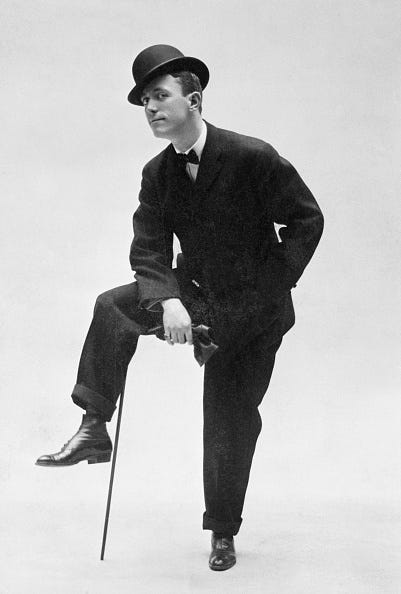“Land’s End” by August Kleinzahler from Hollyhocks in the Fog: Selected San Francisco Poems. © Farrar, Strauss and Giroux, 2017.
ORIGINAL TEXT AND AUDIO - 2017
It’s the birthday of George M. Cohan, born in Providence, Rhode Island (1878). He wrote hundreds of songs and more than 40 shows and musicals. Critics didn’t like them, but theatergoers loved them. In 1904, his breakout show, Little Johnny Jones, took local houses by storm, especially the new numbers “Yankee Doodle Dandy” and “Give My Regards to Broadway.”
Today is the birthday of writer Franz Kafka (1883), who wrote the story The Metamorphosis, about a traveling salesman named Gregor Samsa who wakes up one day transformed into a hideous insect. Many consider it the finest short story ever written. All of Kafka’s most famous works were published after his death, and all contain surrealistic elements that led to the phrase “Kafkaesque,” as a descriptor for bizarre, dark stories.
He was born into a middle-class Jewish family in Prague, the oldest of six children. His father was a temperamental, controlling man, and two of Kafka’s brothers died in infancy. Later, three of his sisters died in concentration camps during the Holocaust. Kafka was a fine student and went on to train as a lawyer, though his heart wasn’t in it, and he later found better work at an insurance company, which allowed him plenty of time to work on his stories.
Kafka was always anxious, and frequently suffered from depression and illnesses. Some historians now believe he may even have suffered from anorexia nervosa and schizophrenia, which may explain some of the more surrealistic plots in his work. In his diary, he once wrote: “The tremendous world I have in my head! But how to free myself, and free it, without being torn in half. And a thousand times sooner be torn in half than keep it in me or bury it. For this I’m here, that’s quite clear to me.”
One of Franz Kafka’s most famous works is The Trial (1925), about a man arrested and prosecuted by remote authorities. The man, and the reader, never learn exactly what the man’s crimes were. He wrote The Judgment (1913) in a frenzy over one night in September 1922. He called that story “a complete opening of body and soul.” During his lifetime, he burned more than 90 percent of his work. He hated most of The Metamorphosis, saying, “Unreadable ending. Imperfect almost to its very marrow.”
Franz Kafka died from tuberculosis at the age of 40 in 1924.
Before he died, he wrote a request to his friend Max Brod: “Dearest Max, my last request: Everything I leave behind me … in the way of diaries, manuscripts, letters (my own and others), sketches and so on, to be burned unread.”
Max Brod ignored his wishes and after Kafka died, made sure that his works were published, and Kafka became famous. In 1988, a handwritten manuscript of The Trial sold at auction for $1.98 million.
It’s the birthday of M.F.K. Fisher, born in Albion, Michigan (1908). She wrote 27 books and hundreds of articles for The New Yorker and Gourmet, and was thought one of the best prose stylists of her day. She grew up in Whittier, California, where her father edited the Whittier News; her family was ostracized for being Episcopalian in a predominantly Quaker town. She learned her way around the kitchen from the family’s cook. She was asked why she didn’t write about more important things, like power or love. She said: “The easiest answer is to say that, like most humans, I am hungry. But there is more than that. It seems to me that our three basic needs, for food and security and love, are so mixed and mingled and entwined that we cannot straightly think of one without the others. So it happens that when I write of hunger, I am really writing about love and the hunger for it, and warmth and the love of it and the hunger for it.”






This is the correct link: https://www.writersalmanac.org/index.html%3Fp=10247.html
I thought the line in “I’m a Yankee Doodle Dandy” was “Born on the 4th of July!” Was George lying to us all these years? :)